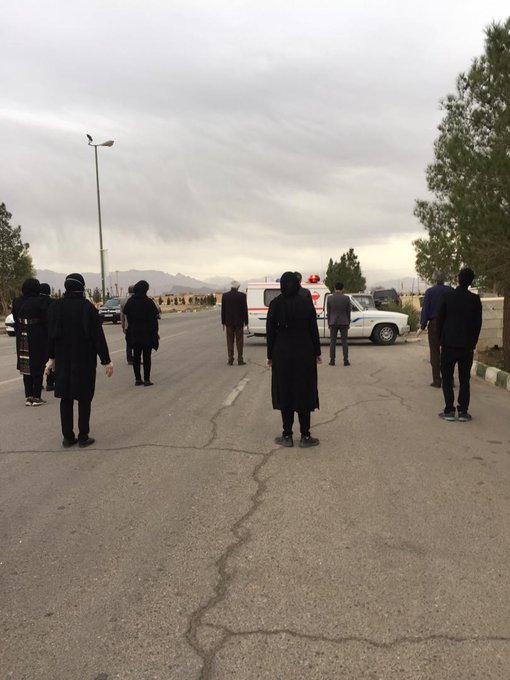RFL/RE – Kambiz says the day he buried his 96-year-old grandmother, who died after contracting the coronavirus, was the “saddest and loneliest” day of his life.
He was the only member of her large family who attended the burial at Tehran’s Behesht Zahra cemetery.
The family did not hold a traditional postburial gathering in order not to endanger others and also in line with government guidelines aimed at slowing the outbreak of coronavirus in Iran.
Grieving relatives and friends who were not allowed to visit his grandmother at the hospital could only call to express their condolences or send messages via social media.
But in a society that puts a big emphasis on strong family ties and where people touch and embrace to express affection, Kambiz (not his real name) tells RFE/RL he felt especially lonely and the experience was traumatic for him.
“Everyone is very sad because we can’t hold a ceremony and mourn together, which is comforting for the survivors,” he says. “We’ve been robbed of [the experience].”
To contain the deadly outbreak of coronavirus, the Iranian government has banned funeral ceremonies while urging Iranians to strictly respect hygienic routines and social-distancing rules.

The pandemic has officially killed more than 3,200 Iranians and infected more than 50,000, as of April 4, though many Iranians and international observers believe the number of dead and overall cases is far higher.
Authorities have said those who die from COVID-19 are buried based on protocols issued by the World Health Organization (WHO). The dead are reportedly placed in body bags in graves covered in lime by trained cemetery workers in protective suits.
Relatives have in some cases been allowed to pray before the actual burial while respecting the spacing rules and not hugging or kissing.
The directives have led to highly unusual burial scenes described by many as “surreal.”

این تصویر آخر سال منه .. نماز میت داییم که بر اثر کرونا فوت کرده.. به همین سورئالی.. بارون میومد .. از هم فاصله داشتیم و هر کس برای خودش گریه میکرد .. خیلی عجیب ، خیلی غمگین ..

21K4:17 PM – Mar 18, 2020Twitter Ads info and privacy2,315 people are talking about this
For most Iranians, grieving alone has added to the distress of losing their loved ones.
The mourning ceremonies held right after burials as well as one week later and 40 days after deaths are an opportunity for families and friends to come together and comfort each other.
But now people are forced to grieve in the isolation of their homes.
Unlike Kambiz, who could say a last farewell to his grandmother, Siavash did not get to see his brother, who died of cancer two weeks ago in the northern city of Rasht.
Siavash had visited him in June but the coronavirus outbreak prevented him from traveling to city on the Caspian Sea again to see his brother one last time and attend his funeral. He says he also recently lost a close friend in Tehran to COVID-19 without being able to say goodbye.
Siavash says many are denied closure as the result of the deadly pandemic. “When you don’t mourn a loved one, you don’t think he’s dead,” he tells RFE/RL.
‘Unexpressed Grief’
The situation has led to concerns about the trauma facing the country’s many grieving families at a time when traditional death rituals have been shattered. Many COVD-19 patients have reportedly died alone in hospital isolation.
“If in your family, among friends and acquaintances, you know someone who has lost a loved one to coronavirus, don’t forget to [share] their grief,” Hadi Yazadani, a doctor and pro-reform political activist, tweeted on March 27.
“Since you can’t mourn with them [in person], pick up the phone and call them,” he wrote.
Health Ministry spokesman Kianush Jahanpur said this week that many Iranians were likely to face “unexpressed sorrow,” while adding that religious teachings and communication tools could help deal with the grief.
He also called on psychologists and psychiatrists to share coping mechanisms.
Amid calls for Iranians to avoid gathering and not hold mourning ceremonies for their loved ones, a large funeral procession with hundreds of people was held last week near Tehran for a former commander with the powerful Islamic Revolutionary Guards Corps (IRGC), where social-distancing rules were obscenely violated by mourners.
The potential health risks from the procession led to outrage on social media and protests by Kianpur, who said on Twitter, “You just have to cry” in reaction to images showing mourners standing next to each other while touching the casket of the IRGC official.
- Golnaz EsfandiariGolnaz Esfandiari is a senior correspondent with RFE/RL.
 Shabtabnews In this dark night, I have lost my way – Arise from a corner, oh you the star of guidance.
Shabtabnews In this dark night, I have lost my way – Arise from a corner, oh you the star of guidance.


